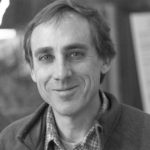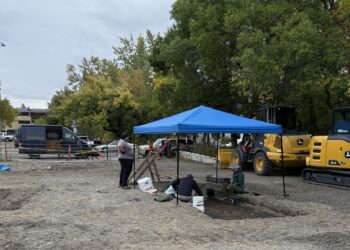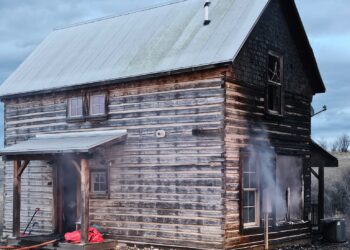Is she getting a free pass from the media—and voters—because of her name in the Cowboy State?

By Todd Wilkinson EBS Environmental Columnist
Yet another political dynasty is rising south of us in the Cowboy State.
Elizabeth “Liz” Cheney, lately a resident and self-proclaimed “hockey mom” in Wilson, Wyoming—and prior to that, a nearly lifelong denizen of suburban Washington, D.C.—is now on a smooth glide path toward achieving something many of her close friends hoped was inevitable: becoming Wyoming’s new lone member of the U.S. House of Representatives.
Cheney is known to all watchers of Fox News in Montana. If she wins in November, she will occupy a seat in Congress that once belonged to her father, Dick Cheney—the former vice president to George W. Bush and defense secretary under George H. W. Bush.
In August, Ms. Cheney breezed to victory in a Republican primary field of nine, receiving no serious challenges from other contenders—nor any meaningful journalistic scrutiny by members of the Wyoming media, which have largely treated her with kid gloves, rarely challenging her canned answers and seeming to accept her ascendancy as a fait accompli.
The reasons why the Wyoming media refrains from holding her to account for statements she’s made on national news programs about issues of high global consequence are puzzling. While her misadventures in applying for a Wyoming fishing license are somewhat interesting, superficially, it is her outspoken views, parroting those of her father, in support of two controversial wars that resulted in the loss of thousands of U.S. soldiers’ lives and more than a trillion dollars expended, that deserves to arouse still other questions. And though she describes herself as a “fourth-generation Wyomingite,” how much does she really understand about the West? To some, she seems in a rush to move back into her old house in D.C.
Cheney’s hardliner rhetoric is no different from that of Sarah Palin and Michele Bachmann, the former Congresswoman from Minnesota. There are traces of it, too, in U.S. Sen. Steve Daines, U.S. Rep. Ryan Zinke, and gubernatorial candidate Greg Gianforte, all Montana Republicans who have been laudatory of both Dick Cheney and Donald Trump.
Cheney’s return to seeking public office follows an abrupt departure from a failed U.S. Senate bid in 2013 that would have likely brought a bruising loss to incumbent U.S. Sen. Mike Enzi, a fellow Republican from Gillette.
She riled voters—and the Republican Party establishment in Wyoming—when she defied protocol and challenged Enzi, invoking Tea Party rhetoric of him not being conservative enough. Along the way she earned the reputation of being a carpetbagger riding the coattails of her father. She even attracted the ire of firebrand Ann Coulter.
Cheney is a lawyer who, amid charges of nepotism, served in the U.S. State Department when her dad served as vice president. Like her father, she speaks with fiery defiant rhetoric to deflect criticism, delivering attacks on Hillary Clinton as if reading from cue cards. She claims Wyoming’s energy economy has been victimized by a “war on coal” carried out by the Obama Administration. She says that she, like Trump, is dedicated “to making America safe again”; that there would be far less turmoil in the Middle East if only the Obama Administration had continued the hawkish—some would say “imperialistic”—policies, including the torture of alleged terrorists, condoned by her father.
But how viable would her candidacy be were it not for her last name? What ability and respect for comity—courtesy and considerate behavior toward others—does she possess to skillfully work across the aisle when the public respect for Congress is at a historic low caused by partisan gridlock?
In January 2010, conservative political commentator Andrew Sullivan posed this question in The Atlantic: “If Liz Cheney were not her father’s daughter, why would she be on the Sunday talk shows? Why is she added to ABC News’ roster? What experience does she have in journalism or government? Why is she brought on to spout the kind of extremist, partisan paranoia that alone can make her father’s incompetence and failure to defeat Jihadist terror admirable?”
Finding the question intriguing, writers for The Economist also chimed in: “The problem with Ms. Cheney is not inexperience, but family connections. Her appointment to powerful State Department positions, like her husband Philip Perry’s appointment as general counsel of the Department of Homeland Security, was part of a self-reinforcing habit of nepotism and insularity that plagued George W. Bush’s administration.”
The Economist’s authors added: “[Dick Cheney’s] reliance on such loyal associates ultimately trapped him inside an echo chamber of bad advice on issues such as torture and military intervention abroad. The reason why you shouldn’t appoint your daughter as your surrogate inside the State Department isn’t necessarily that she lacks the relevant experience. It is that your daughter is very likely to give you an inflated sense of your own genius, and that relying for strategic advice on a familial clique is likely to drive you into a blind corner of actions that only look defensible to people who are related to you.”
Here, then, are some of many possible questions the Wyoming media should, but probably will never, pose to Liz Cheney. They deserve answers.
The New West one-way interview with Liz Cheney
Todd Wilkinson: You have been labeled a carpetbagger by some members of your own party; a candidate who, prior to your relocating to Wilson in order to qualify as a Wyoming resident, probably hadn’t spent more than a couple years, cumulatively, of your adult life living in the state. How can one claim to be an expert on “Wyoming values” and have an intimate knowledge of working class people in this state when you’ve lived the overwhelming majority of your time in the D.C. Beltway and today have an address in an elite subdivision in Jackson Hole that many say “isn’t real Wyoming,” and a bubble where so few Wyomingites can afford to live?
LIZ CHENEY:
TW: Let’s talk about an issue of personal character. You’ve been accused by critics of throwing your own sister under the bus when you refused to advocate for same-sex marriage and equal protection under the law. What kind of politician are you if your personal convictions in caring for your own loved ones are not consistent with your public policy declarations? Or, do you view same-sex couples as being immoral?
CHENEY:
TW: You are your father’s greatest defender. Both of you have been vocal critics of President Obama and Hillary Clinton, condemning her foreign policy decisions, in particular blaming her for the deaths of four Americans murdered at the American Embassy in Benghazi, Libya. Clinton bears responsibility, you say, because it happened on her watch while she was serving as Secretary of State. Using the same logic, what do you say about the 3,000 Americans who died in the 9/11 attacks that occurred while your father was vice president and failed to heed intelligence suggesting imminent attacks? If Hillary Clinton’s inaction in not preventing the attacks in Benghazi disqualifies her for being president, then shouldn’t the inability of your father’s administration to prevent 9/11—which killed 3,000 more people on American soil than the number who died in Benghazi—also be a solid reason to question you and your father’s ability to lead and keep America safe?
CHENEY:
TW: This is not a question from me but borrowed from Megyn Kelly of Fox News who posed it to your father while the two of you were out on book tour and after you wrote an op-ed together condemning Obama. Since you didn’t answer Kelly’s question then, please take a stab at it now. She said: “In your op-ed, you write as follows: ‘Rarely has a U.S. president been so wrong about so much at the expense of so many.’ But time and time again, history has proven that you got it wrong as well in Iraq, sir. You said there was no doubt Saddam Hussein had weapons of mass destruction. You said we would be greeted as liberators. You said the Iraq insurgency was in the last throes back in 2005. And you said that after our intervention, extremists would have to ‘rethink their strategy’ of jihad. Now, with almost a trillion dollars spent there, with 4,500 American lives lost there, what do you say to those who say you were so wrong about so much at the expense of so many?”
CHENEY:
TW: One more follow-up question about the US invasion of Iraq and Afghantistan. It is estimated that thousands upon thousands of civilian noncombatants, which, of course, means that lots of innocent children were killed, maimed or orphaned and families destroyed by our actions. Do you think that that kind of “collateral damage” might be responsible for the ongoing level of hostility toward Americans by people living in the region? And do you, as an ardent military interventionist, really believe America can and should assert its will upon the rest of the world, at a cost of American lives and resources that would better serve our country at home?
CHENEY:
TW: Your father left office with a 13 percent public approval rating, which may be the lowest of any vice president in US history. And The New York Times, in an editorial, said that your father and associates ought to be investigated for war crimes based upon evidence that came to light in a U.S. Senate report. Why do you think the American public had such a low assessment of your father’s performance? Given that your policy positions are identical to your father’s, how do yours better reflect the values of Americans?
CHENEY:
TW: You have portrayed the research surrounding climate change as based on “junk science” and yet experts from the National Academy of Sciences (the most respected scientific body in the world) as well as leaders in the U.S. military have said human-caused climate change is real and that it is a threat to human health, the environment, the economy of our country and our national security. In fact, climate change is expected to have disastrous consequences for Wyoming in the form of low snowpacks and water shortages, severe impacts to agriculture, wildfires (that cannot be stopped by logging forests), and downsides for the state tourism economy. Who are your scientific sources? And what special insight do you possess about climate change that is superior to those of prominent globally-respected scientists and U.S. military leaders?
CHENEY:
TW: You and fellow Neocon Bill Kristol, with whom you co-founded “Keep America Safe,” opposed the new START nuclear treaty with Russia. Yet a distinguished group of experts, including prominent Cold War Republican statesmen like George Shultz, who served under Ronald Reagan, and Henry Kissinger, and 15 other former secretaries of State, Defense and Energy, serving Republican and Democrat presidents, said re-ratifying START was important to reduce the nuclear threat. Again, as with the questions about climate change, what special insight do you possess that is greater than that of more than a dozen experts with military/diplomatic experience dealing with the Russians and former Soviet Union?
CHENEY:
TW: You and your father have been outspoken in your criticism of the nuclear deal with Iran yet when you were serving in the State Department the U.S. had little success in halting Iran’s nuclear program. You’ve also condemned the Obama Administration for the disaster that has occurred in Syria. You were head of the State Department’s Iran Syria Policy and Operations Group whose goal was to promote regime change. That didn’t happen. You were in a position to effect change in the region and experts say you failed.
CHENEY:
TW: You and your father continuously claim that America has lost respect and standing in the world during the Obama presidency, an assertion that appears to be challenged by facts. Peter Beinart wrote in The Atlantic: “For more than a decade, the Pew Research Center has been asking people around the world about their opinion of the United States. The upshot: In every region of the globe except the Middle East (where the United States was wildly unpopular under George W. Bush and remains so), America’s favorability is way up since Obama took office.”
CHENEY:
TW: Decades’ worth of his own words and rigorous fact-checking shows Donald Trump to be a chronic opportunistic liar, chauvinist, racist and bully, that he appears to suffer from dishonesty and stunted emotional maturity, and that he has no real knowledge of foreign affairs. Many in the military say he is utterly unfit to be commander in chief, especially with authority over our nuclear arsenal. Both Ted Cruz and Mitt Romney, whose candidacies you supported, have backed that negative view of Trump. And so does Richard Armitage and Brent Scowcroft who served alongside your father under Gerald Ford and George H.W. Bush. Yet you have thrown your support behind Trump, a man who has praised the leadership of Russian President Vladimir Putin. Do you really see Trump as behaving presidentially?
CHENEY:
TW: Here’s what Trump said in a short video about your father and his book, calling him angry, nasty and a liar “who did a rotten job as vice president and nobody liked him.” Are you still impressed with Mr. Trump?
CHENEY:
TW: Part of your campaign stump speech, like your Republican counterparts in Montana, is saying the Obama Administration and the Environmental Protection Agency is waging a war on coal. In fact, Wyoming benefited mightily from regulations that opened markets for its low sulfur coal at the expense of coal from Appalachia yet no politicians here complained when thousands of coal workers in the East were put out of work due to those regulations. Health experts today note regulations to reduce pollution emissions at power plants already are saving human lives and cutting the incidence of asthma in kids. For every $1 invested, the American public will realize $7 in health benefits. Energy economists say it’s been the glut of cheap natural gas that has negatively impacted Wyoming’s coal industry as much as environmental regulation. And they say Wyoming has been slow to embrace emerging technology; that the state would have been far better positioned to weather the shift away from coal just as tobacco-growing states reckoned with society’s awakening about the deadly consequences of smoking cigarettes. Why do you continue to push the “war on coal” narrative when you know it’s a huge exaggeration of the truth?
CHENEY:
TW: Do you support the radical push by U.S. Rep. Rob Bishop of Utah—deemed illegal by legal scholars and which, by a huge margin is opposed by hunters, anglers, recreationists and general citizens—to have federal public lands ceded to state ownership? And, if the states cannot afford to steward those lands, do you favor, as radical Sagebrush Rebels do, that they be sold off and privatized?
CHENEY:
TW: Abraham Lincoln and Theodore Roosevelt were aligned with the GOP and they were progressives. Do you think the GOP still deserves to call itself the party of Lincoln and Teddy Roosevelt? If yes, how—and please provide examples? If not, then why?
CHENEY:
TW: Colin Powell, the former Secretary of State who served President Bush with your father and you had some unflattering things to say about the two of you. The Four-Star General also felt burned earlier by the negative things your father said about him in his book. How do you respond?
CHENEY:
TW: In one of the few instances you’ve publicly disagreed with your father, you defended the candidacy of Sarah Palin as vice president and said she would be an excellent leader. Your father said John McCain’s selection of her as a running mate was a mistake. Did you, do you, really find Palin to be a seriously intelligent person capable of holding the second most powerful position in U.S. government?
CHENEY:
TW: Shortly after you were on the air with Rush Limbaugh this summer, you tweeted this message: “Hillary Clinton is a crooked and corrupt felon who is being protected by an unethical Attorney General and President.” Clinton has never been convicted of a felony and you would know as an attorney that making such an accusation is libelous yet you persist. Apart from that, how would you define the term “statesmanship” and do you believe that you are deserving to be called a statesman working for the good of all Americans?
CHENEY:
TW: You have five children who are hearing your words and watching your actions on the public stage. Are you setting a solid example, worthy of emulation, for how to build a better and more civil country, state and society, or does that not matter?
CHENEY:
Todd Wilkinson has been a journalist for 30 years. He is author the recent award-winning book “Grizzlies of Pilgrim Creek: An Intimate Portrait of 399, the Most Famous Bear of Greater Yellowstone,” featuring 150 astounding images by renowned American nature photographer Thomas Mangelsen. His column appears in Explore Big Sky every week under a partnership arrangement with the Wyoming online journal, TheBullseye.media.













